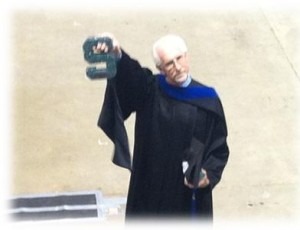 Last weekend turned out to be a very special one for me. I received a great honor from my alma mater, Michigan State University – an Outstanding Alumni Award from their College of Communications Arts and Sciences.
Last weekend turned out to be a very special one for me. I received a great honor from my alma mater, Michigan State University – an Outstanding Alumni Award from their College of Communications Arts and Sciences.
It was truly a memorable occasion that I shared with other amazing honorees, as well as family and friends. I was aided and abetted by Dr. Ed Cohen, Paul Jacobs, and MSU’s Gary Reid, as well as many of you who wrote recommendations on my behalf.
So what do you learn from an event like this? Well, aside from being reconnected with an amazing group of students and educators, Dean Pam Whitten is building something special at MSU. A look at their new Media Sandbox program speaks volumes about where higher education should be headed, in partnership with the professional community of MSU alumni, many who have gone on to become major players in media.
And as I met some of the other professionals who spent their formative years in East Lansing, I garnered a deeper appreciation for their stories and pathways to success.
Glenn Marrichi is one of those honorees, an advertising agency executive in Chicago who has worked for some of the best and the brightest. During Glenn’s presentation, he quoted the legendary Hal Riney, and this line has been bouncing around in my head since:
“Turn facts into feelings.”
Unknowingly, this is what we attempted to do with this year’s Techsurvey8. While the study is loaded with thousands of data points, the story that has resonated in the industry has to do with radio’s emotional triggers – why the audience listens in the first place.
Companionship, mood elevation, and escape are all factors that transcend contests and promotions. Too often, radio spends more time on getting its positioning statements right than it does in creating emotional connections to its audience and filling their needs. Why do people come to radio stations to begin with? It’s a question that every programmer, manager, and owner should be asking themselves.
Our goal with Techsurvey8 was to boil down all those numbers into eight key takeaways that tell stories about the role of radio in people’s lives, as well as the challenges and opportunities around the corner. I can show you a pie chart that shows how 52% of the sample owns a smartphone, but if I can tell you a memorable story about how these devices have changed our lives – as we did on video with “Goin’ Mobile” – I create an indelible narrative that you can’t get out of your head.
Our study also suggests that broadcast radio doesn’t need to devise a better algorithm than Pandora’s. A better endeavor would be to recommit itself to emotionally connecting with consumers and communities in meaningful and memorable ways. Understanding why listeners bring radio into their lives, and then truly focusing on those needs would move the needle for many radio brands.
Riney’s comments also hit home on the sales side of the spectrum. Yes, there may always be cost per point, average ratings, and cume numbers to bandy about and negotiate over. But the old “live by the book/die by the book” adage has never been more true in today’s environment.
The ability to tell a story about your station and your brand is what should separate radio from many of its new media competitors. The listeners that have been touched by your programming. The DJ who has made a difference in a hometown. The local advertiser who saw her business jumpstarted by creating sales partnerships with area radio stations. These are the stories that people tell again and again – the narrative that explains why most of us got into radio in the first place. Those values aren’t dated or “old school.”
 Hal Riney (pictured) understood the true essence of the impact and power of words and emotions. So did Steve Jobs. So does Clayton Christensen and Simon Sinek. All of these branding philosophers encourage us to connect on an emotional level with stories – not data.
Hal Riney (pictured) understood the true essence of the impact and power of words and emotions. So did Steve Jobs. So does Clayton Christensen and Simon Sinek. All of these branding philosophers encourage us to connect on an emotional level with stories – not data.
In the mindset of consumers, radio stations don’t “own” formats. Your association with a positioning statement is not why the audience tunes in. Your ability to generate “likes” on a Facebook page is not about your latest cash giveaway.
You will never move people with numbers.
You will capture their imagination with a great story.
Tell it.
P.S. If you’re interested in seeing the results of Techsurvey8 and the stories that we’re telling about radio and digital, the Conclave has put together a free webinar on Wednesday, May 23. You can sign up here.
- What To Do If Your Radio Station Goes Through A Midlife Crisis - April 25, 2025
- A 2020 Lesson?It Could All Be Gone In A Flash - April 24, 2025
- How AI Can Give Radio Personalities More…PERSONALITY - April 23, 2025




Congratulations on your well-deserved Outstanding Alumni Award ! ( You look great in that academic regalia too! )
Thanks, it had been just a few years since I’d worn a gown. Appreciate it, Greg.
Congrats Fred!
I was very honored to have this experience. Thanks, Larry.
Fred: Congratulations on your award. In light of this excellent piece on turning facts into feelings, I thought the following might be of interest. It demonstrates what the article speaks to.
https://www.youtube.com/watch?v=8OtsW-W1Ik4
Nick, YOU are the man. Great job on this & another reason why your words truly resonate with listeners. Thanks for sharing this.
Fred – Your comments are, of course, spot on. However, who is allowed to do this on the radio anymore? PPM paranoia dictates that what little airtime is actually allotted to what little live talent there is must be used to drive people to the station’s web site “for more information”. Besides the loss of time I fear we have lost the people who actually know how to tell a story…the true genius of radio has always been its ability to tell stories in a relatively short amount of time. Ironically, it is that characteristic that is at the core of Social Media. How far will radio’s entertainment value fall before someone recognizes this?
Steve, I appreciate your concerns and they are real. Somehow the “greats” have a way to paint pictures in short windows, often “earning” more talk time because they’re good. But the storytelling needs to be told by PDs and sales managers, as well as the folks on the air. You’re also right about social media, and isn’t that possibly why radio struggles so mightily to harness it? Thanks for keeping the conversation going.
“
Congratulations Fred! Your dedication to our industry is unmatched.
No one has to agree with his politics but everyone should watch what Glen Beck says about radio and his first big break. At the 4:20 mark listen to his passion about the key to great radio.
https://www.youtube.com/watch?v=09pjTgLyO0M&feature=youtu.be
Thanks for the comment, Mike, and for the Beck video. It is fascinating to hear his POV on the medium that we all love. Thanks for sharing.